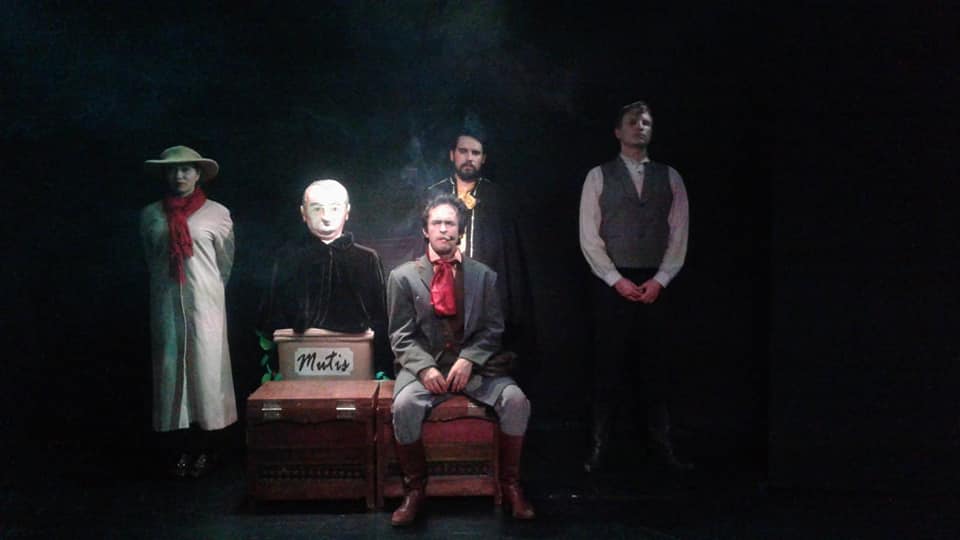Dramaturgy, history, past and fiction: a proposal for social change from the theater
Main Article Content
Abstract
The eighteenth century saw the beginning of a revolution in the figure in charge of conceiving dramatic texts. Although the figure of the playwright has existed since Greek antiquity, it was in the midst of the German Enlightenment that the settlement of the critical and analytical perspective took place, which gave rise to shake the foundations of drama from other branches of knowledge. This is the origin of the notion of the playwright, as a professional who relates philosophical, scientific, political and ideological precepts as a driving force that allows the expansion of the function of the dramatic text and its subsequent confrontation with the spectator in the communion of the scenic fact. The present document proposes to relate the playwright's craft with the existing disjunctive between the official History of the facts and the creations of the field of Fiction that have given rise to them. Supported by different points of view, it seeks to legitimize the idea that dramaturgical fiction can also be a fundamental element for the revision of historical facts that question the past of a social group, its awareness of the present and the way in which they will face their future.
References
Archila, M. (1997). El historiador ¿o la alquimia del pasado? En Ortiz, C. & Tovar, B. (Eds.), Pensar el pasado (pp. 75-124). Departamento de Historia de Universidad Nacional de Colombia; Archivo General de la Nación.
Aristóteles. (2004). Poética. (A. Villar, Trad.). Alianza Editorial. (obra original publicada en 335 a. C.)
Artigas, W., Díaz-Chieng, L. Y., Gómez Arévalos, J. A., Camero Gutiérrez, J. S., & Baron Velandia, B. (2023). Habits of research: five practical contributions to research training. Praxis Pedagógica, 23(34), 1–9. https://doi.org/10.26620/uniminuto.praxis.23.34.2023.1-9
Camero Gutiérrez, J. S. (2016). Elementos de la historiografía como experimentación en la construcción de un texto dramático [Trabajo de grado, Universidad Distrital Francisco José de Caldas]. https://repository.udistrital.edu.co/handle/11349/5663
Cruz, M. (2004). Escritos sobre memoria, responsabilidad y pasado. Universidad del Valle.
Del Monte, F. (2015). Dramaturgista: el oficio sutil de dotar de sentido a la escena. https://www.academia.edu/33268874
Esguerra García, M. A. (2014). Una dramaturgista en busca de cuerpos protagonistas [Trabajo final de maestría, Universidad de San Buenaventura]. http://hdl.handle.net/10819/2146
Fuentes Medrano, Á. (2012). Fragmentos del libro: El dramaturgista y la deconstrucción en la danza. Revista La Tadeo (Cesada a Partir de 2012), (77), 50-60.
Hormigón, J. (2008). Trabajo dramatúrgico y puesta en escena (Vol. 1). Publicaciones de la Asociación de Directores de Escena de España.
Hormigón, J. (2011). La profesión del dramaturgista. Publicaciones de la Asociación de Directores de Escena de España.
Jitrik, N. (1995) Historia e imaginación literaria. Biblos.
Luckhurst, M. (2008). La palabra que empieza por D. Fundamentos.
Martin-Barbero, J. (2015). Estéticas de comunicación y política de la memoria. Calle 14, 11(16), 14-31. https://revistas.udistrital.edu.co/index.php/c14/article/view/10136
Pavis, P. (2015). Diccionario del teatro. Paidós.
Pavis, P. (2016). Diccionario de la performance y del teatro contemporáneo. Paso de Gato.
Ramírez, C. (2013). Vigencia del teatro histórico. Universidad Distrital Francisco José de Caldas.
Ramírez, C. (2014). Teatro histórico hoy. Revista Calle 14. Calle 14 revista de investigación en el campo del arte, 8(11), 96–107. https://doi.org/10.14483/udistrital.jour.c14.2013.2.a08; https://revistas.udistrital.edu.co/index.php/c14/article/view/5609
Ramírez, C. (2018). Ficstoria. Aforismos para el Teatro de Ficción Histórica Seguido de Memoria de un Teatro de la Historia. (Documento inédito) Proyecto Curricular de Artes Escénicas. Universidad Distrital Francisco José de Caldas.
Silva, R. (2014). Lugar de dudas: sobre la práctica del análisis histórico. Universidad de los Andes.
Staff, F. (2021, 18 febrero). JEP eleva a 6.402 las víctimas de “falsos positivos”. Forbes Colombia. https://forbes.co/2021/02/18/actualidad/jep-eleva-a-6-402-las-victimas-de-falsos-positivos/
Todorov, T. (2008). Las morales de la historia. (M. Bertran, Trad.). Paidós. (obra original publicada en francés en 1991).






